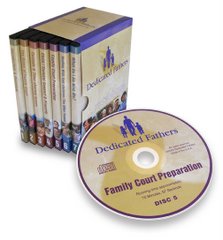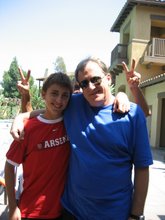Parental Alienation (part 1)
www.dedicatedfathers.org
BY: Marvin L. Chapman
Within the mental health field there continues to be an ongoing debate as to whether or not there is such a thing as parental alienation. Some research appears to support the notions behind parental alienation and its effects on children, and yet other research appears to refute it. However, for those of us in the trenches - especially those of us who have spent years in the family court arena - there is no doubt about parental alienation and its consequences.
Parental alienation is generally defined as one parent repeatedly and continuously programming or brainwashing their child against the other parent. Parental alienation may include such acts as obstructing, interfering or outright denying the child’s right to spend time with the other parent. It usually includes statements that the other parent does not care about the child, is too busy for the child, or similar statements all used to coerce the child into believing the other parent and even their extended family do not love the children or care about them anymore. Such begins the breaking down of the parent-child relationship. In its worst form, parental alienation involves false allegations of abuse, neglect, or some other form of alleged harm to the child.
Of the research I have read, most of those opposing the notion of parental alienation have a clear bias towards mothers. This is not surprising given the fact the mother is almost always the parent who attempts to alienate the children, very seldom the father. Those who oppose the notion of parental alienation overwhelmingly state that if there is any real alienation, then it comes from the fathers’ own actions and not due to any wrongdoing on the part of the mother. It appears to me that those who buy into the notion only mother’s can nurture and care for children also buy into the notion that mother’s would never purposefully and systematically alienate the children against their father.
In over 26 years within the family courts, I can categorically state parental alienation is very real in family law. Anyone spending half a day in any family court will clearly see the systematic alienation that is perpetrated in many cases (but then going to court and finding out what really goes on is NOT scientific study - it’s REALITY). Some form of parental alienation is in about fifty percent (50%) of all of my cases as indicated by the following:
The number 1 complaint of all fathers I have seen in over 25 years is that the mother is causing interference, obstruction and denial of their children’s right to spend time with the father.
The number 2 complaint of all fathers I have seen in over 25 years is that the mother is repeatedly and continuously making degrading and derogatory remarks about the father either directly to the children, or at the very least within hearing distance of the children.
The number 3 complaint of all fathers I have seen in over 25 years is that the mother prevents or severely limits the father from having any significant say in the lives of their children as to health decisions, educational decisions, extra-curricular activities and other general welfare decisions - actions which are made solely and unilaterally by the mother.
As stated above, I have found some form of parental alienation in about fifty percent (50%) of all of my cases for over 26 years as outlined above. Therefore, for me and my clients, parental alienation is extremely common. No only are these acts alienating the children, I support the notion that such acts rise to the level of child abuse. It is abusive for one parent to interfere, obstruct or denial children their right to spend time with the other parent. It is abusive for one parent to continuously make degrading and derogatory remarks about the other parent, whether directly to the children or within hearing distance of the children. And it is abusive for one parent to make sole unilateral decisions about the children without any significant input from the other parent - basically cutting the other parent out of the decisions making process for their children.
Unfortunately, what I call child abuse, family court judges call “primary physical custody to mother.” I see hundreds of clients each year and in over half of those cases I hear at least one (1) of the complaints outlined above. Extrapolate those numbers to the general population and we can only guess at the real number of children being abused through the alienation action of their mother.
The reasons one parent alienates the children against the other parent are as varied as the parents’ themselves. However, there are some attributes which have been identified as being the driving force behind alienating behavior, which are the following:
1. Alienating parents may have feelings of abandonment, anger and rage at the other parent;
2. Alienating parents many times are seeking revenge for perceived wrongs;
3. Alienating parents may have acute or chronic psychological and/or emotional problems;
4. Alienating parents typically harbor resentment from events that happened during the marriage;
5. Alienating parents can be over-enmeshed with their children, resulting in over-protectiveness; and
6. Alienating parents may have an overwhelming need to “prove” they were right and the other parent was wrong.
Likewise, some children are more susceptible to alienation than others and there are some attributes which have been found to be common among children who succumb to alienation tactics, which are the following:
1. Children with a strong psychological bond with the alienating parent;
2. Children with an excessively dependent relationship with the alienating parent;
3. Children who live in fear of losing the alienating parent’s love and support;
4. Children who become overly protective of the alienating parent - sometimes taking on the role of a surrogate spouse (taking “care of” the alienating parent); and
5. Children who respond positively to outside encouragement for expressing their feelings of being abandonment or rejection by the alienated parent.
Please check back next week for part 2 of this article on Parental Alienation.
Be sure to visit our website for more information on divorce and child custody.
www.dedicatedfathers.org
Wednesday, June 27, 2007
Parental Alienation (Part 1)
Posted by
Dedicated Father
at
7:19 PM
189
comments
![]()
Labels: child abuse, child custody, child support, children, divorce, divorce coach, divorce mediation, family court, fathers rights, kids, parental alienation, parenting rights, paternity
Subscribe to:
Posts (Atom)


















